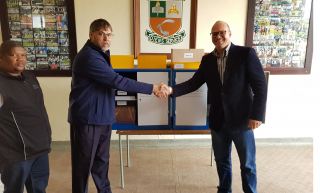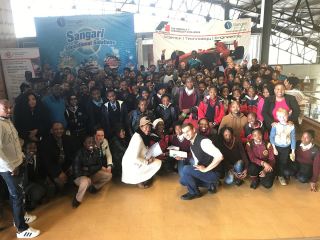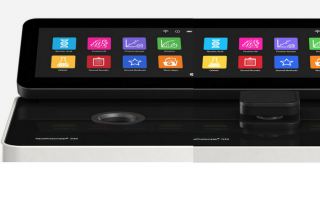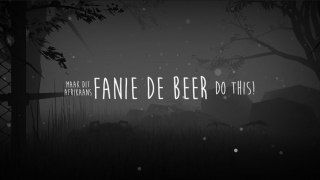Three Cape Winelands High schools receive a massive Science boost from Gouda Wind Farm…
The principals and teachers of Tulbagh High, Waveren High and Roodezandt Secondary – were delighted to each receive the latest CAPS approved Natural Science, Physical Science and Life science kits at a special handover function at each of the schools last week, proudly sponsored by Gouda Wind Farm – Blue Falcon.
One of the exciting kits covers the FET physical sciences curriculum for grades 10 to 12. Topics include mechanics; waves, sound and light; matter and material; and chemical change. They contain all the necessary chemicals and are housed in a lockable metal cabinet with topic trays. The other kit consists of Life Sciences material and the third Natural sciences and Technology, all of which come complete with a teacher’s guide and learner worksheets.
The science kits were presented to the three schools by Irfaan Petersen, Economic Development Manager at Acciona Energy Global South Africa. He said that South Africa’s future prosperity depended on increasing numbers of graduates in science, technology, engineering and mathematics and that this process started at school level. “We hope that the science kits will help to improve the performance of learners in these subjects at local schools. This will enable them to go on to university and ultimately begin careers in engineering and scientific fields which will contribute to a vibrant economy” added Petersen. “We are strong believers in investing in our local communities and will follow the progress of the learners at these nearby schools with interest,” he said.
Mr AM Beerwinkel, Principal of Roodezandt Secondary said, “We are delighted to receive these science kits which will be a major boost to our teaching programme. It will help our learners to engage with science and increase their understanding and appreciation of a subject which many believe to be a difficult one.” He thanked the Gouda Wind Farm – Blue Falcon for their support, saying, “This is a fine example of a private sector partnership at local level which aims to tackle the national challenges facing South Africa.
”The Department of Basic Education’s (DBE) Director for Partnerships in Education, Mr Louis Taylor added “These are the youngsters who have the potential to become the country’s technical leaders of the future. We view this as an investment in the learners, in their schools and, on a wider scale, in education and the economic growth of the nation. ”It is clear that by providing essential equipment in classrooms we can boost academic performance at schools. Corporate South Africa has a critical role to play in this process and we are grateful to Blue Falcon for this gesture,” continued Taylor.
The project was coordinated and managed by Ahmed Motala of the New Africa Education Foundation, an NPO that has partnered with Blue Falcon to roll out the project to the schools.
30 Schools do CAD Training for F1 in Schools Competition
Over the July holidays 170 pupils from 30 schools in the Gauteng region, including 30 teachers competed a computer Aided Design (CAD) introduction course in preparation for the 2017/18 F1 in Schools race season.
The training, provided by Sangari Education, was done at Tshwane University of Technology. The teams that attended are competing for the chance to go to the international competition in 2018.
“Students and teachers worked through tutorials, and on completion, each team designed their own F1 cars that will be competing in the racing scheduled to start in August,” said Pieter du Plessis, F1 in Schools programme manager at Sangari Education.
“Based on each team’s design, the F1 cars will be manufactured at Sangari Education’s offices overlooking the Kyalami race track. It is a great setting to prepare for the F1 in Schools competition,” he said.
The racing cars are designed using Siemens’ Solid Edge CAD software supplied locally by ESTEQ, who are also assisting Sangari with training of the teachers. This software is used for designing the shape as well as simulating the airflow allowing the design to be optimised before sending through for manufacture on a high-precision milling machine.
“The vehicles are then tested in a wind tunnel to ascertain the resistance characteristics and modifications are made if necessary.” The world record is 0.997 seconds for the F1 cars rocketing along the 20m race track.
In support of the F1 in schools Challenge the Gauteng Department of Education has deployed Technology Senior Education Specialists in every district to assist with the roll-out of the programme. The Department is excited to see the impact the experience will have on the learner’s ability to relate to the theory being taught in the technology syllabus and the overall improvement in Maths, Science and Technology results, said Mr du Plessis.
F1 in Schools is as an educational competition that promotes Science, Technology, Engineering and Mathematics (STEM) where schools build a model F1 racing car and compete in inter-school racing competitions. The winning team will represent South Africa at the international finals later this year,” said Bez Sangari, CEO of Sangari Education.
Pule Kgasoe, teacher at Aurora Girls High School in Soweto, who competed in the 2016/17 season, said: “The competition has raised our students’ work ethic. They are now more organised and disciplined, and the programme has created new interest in maths and science.”
“The F1 programme has also enabled students to gain more confidence as well as improve their time and resource management skills,” he said. “Team work has encouraged students’ on a journey of self-discovery. New career paths are being explored based on the various roles each student plays in the development of their F1 car.”
Mr Kgasoe said there is also more interest from other students who have seen the benefits from learning science and maths.” Mr Sangari added that the programme develops entrepreneurial skills in students who are required to research, prepare a business plan and build links with industry to gain sponsorship. Students gain first-hand experience in marketing and accounting as they need to provide a complete portfolio as part of the competition.
“The F1 competition focuses on blended learning through a cross curricula approach where learners physically apply what is learnt in the classroom. The true value lies in how learners take ownership of their own learning,” he said.
“What makes the F1 in Schools Technology Challenge different is that it entails a comprehensive and inclusive learning approach. Learners engage with subjects that improve their literacy, numeracy, sport and sports science, design and technology, art and design, textiles knowledge, STEM learning, computing, and business and enterprise,” concluded Mr Sangari.
MGLI launches online course exchange
Johannesburg – April 9, 2017– MathsGenius Leadership Institute (MGLI) is pleased to announce that it has launched Diretsa, https://www.diretsa.com a crowd-sourced course marketplace for 21st century skills in order to meaningfully contribute to the skills development goals as set out by United Nations and the African Union.
The platform intends to lower the barrier of entry into knowledge creation sharing and acquisition thus has been structured in such a way that every user will be able to create their own customized website and share knowledge with the world. As a global education marketplace, Diretsa is focused on securing partnerships with top educators from around the world in order to provide African learners with access to leading educational programs and information. The call for content publishers is not limited to top professors but is open to anyone who feels they have a skill to share with the world. Most African countries are suffering from infrastructure deficits and this is directly impacting learning for the continent that has the highest youth ratio in the world. It is exciting for Diretsa to be a strategic partner to content publishers and consumers and hopefully it will have the intended impact.
Diretsa has begun to drive awareness of the MGLI’s vision to democratize education for emerging markets by engaging various stakeholders in the African continent. Diretsa also looks to be a sponsor one of Africa’s largest education conferences, EduWeek that brings together educational movers and shakers from around the world to Africa. To educate the people in developing countries, they require access to global educators’ programs and this conference is a massive opportunity to network and exchange value.
Anticipated strategic partnerships with various leading institutions in the USA and venture capitalists will further bolster Diretsa’s ability to add value in Africa’s education ecosystem as the platform of choice. By bridging the access gap, Diretsa is solving a huge problem and helping developing countries achieve their objectives to skill up the African continent. Educators from around the world and learners across Africa can come together on one platform”, says Edzai Zvobwo, Chief Genius at MathsGenius Leadership Institute (MGLI).
Mobile Spectrophotometry that expands research beyond the limits of the lab
UV/Vis-Spectroscopy is the most popular analytical tool in fields such as clinical chemistry, the pharmaceutical industry, research and very often in quality assurance. This is mainly due to advantages such as low time and labour consumption, precision and reproducibility. Nano-spectrophotometric equipment takes this one step further with the ability to preserve sample material by using very small volumes and introduced equipment that is much easier to use. United Scientific, being the sole distributor of Implen Nanophotometer in South Africa, supplies the Nanophotometer range of that takes usability and precision to the next level with features such as
- On device touch screen display
- On board processing,
- Limitless spectroscopic applications that include methods such as Nucleic Acids, Protein UV, Protein Assays, Kinetics, OD600 Cell Density
- Interoperable with a number of devices such as desktop PC , Android and iOS devices.
- Flexible data transfer with Wi-Fi, USB A/B, HDMI and LAN
- Sample and Blank control features to ensure precision and reproducibility.
How your Lab will benefit from acquiring an Implen Nanophotometer.
Buy one and use everywhere
The Implen NanoPhotometer series is ultra portable with a very small size of 20cm x 20cm x 12 - shorter than a 30 cm ruler down the length and width - and weighs less than 5 kg. Each unit have has a build built in, high performance computer with 8 GB of onboard memory. This means that it can easily be moved between labs or buildings on the same premises, eliminating the need for the cumbersome installation of individual units, and an excellent investment for shared instrument labs. Further, each unit in the range can be fitted with a battery that lasts up to eight hours, making it suitable for fieldwork and useful in temporary lab setups.
Efficient use of Sample material
Implen Nanophotometer offers the highest degree of accuracy with the smallest sample of volume, as little as 0.3 microliters, making it the perfect solution for analysing lower volumes at lower concentrations in order to save precious sample material. Microvolume methods removed the requirement for dilution by directly assaying the sample. A capillary film is formed between two quartz surfaces with each analysis, eliminating the need for surface tension and ensuring that the sample is compressed to two precisely defined path lengths without being stretched.
Connect your audience with multiple devices
The Implen NanoPhotometer range allows users to engage a range of audiences live, to observe experimental output on multiple devices such mobile phones, tablets and flatscreens with connectivity options that includes wifi, lan and usb. This makes Implen Nanophotometer ideal for classroom and conference presentations, fieldwork and lab demonstrations.
Certainty, efficiency and accuracy
The Nanophotometer range incorporates physical and technological features that protects samples from contamination and evaporation and detects anomalies such as air bubbles, sample impurities, turbidity, lint residue, high background and residues from previous samples and other potential contaminants and interference. This includes the patented Sample Compression Technology that shapes and seals liquid samples into a precisely defined flat layer of even thickness.
Smart Solutions for smart labs
There are many challenges to performing clinical research in resource-limited settings. Considerations that need to be addressed can include size, space, data communications networking and access to equipment for multiple teams. The Implen nanophotometer was designed specifically to address such concerns, being compact, easy to set up, standalone portable and allowing plug and play data sharing. The quartz heads is easy to clean, simply wipe it with a microfibre cloth to remove all traces of the sample. Implen’s trust in appointing United Scientific as the sole agent for equipment such as the Nanophotometer range cements our status as the equipment and scientific instrument supplier of choice for smart laboratories in Southern Africa.
Somerset West’s Own Indie Game Studio
Indie games are fast becoming a trend in South Africa, catching on from the overseas markets. These days, children and adults alike are playing mobile games as never before. People are always hungry for something different, which is where indie games – or ‘independent’ games – come in, providing players with something other than the mass-produced mainstream products.
Now, Somerset West can boast with its very own game studio that started turning its cogs in February this year. For its first month of existence, the studio was run out of the founder’s mother’s basement – typical indie game studio protocol, if history is anything to go by. Now, running from a house close to De Hoop Primary School, the studio focuses on creating mobile games (such as their recently released Afrikaans game, Fanie de Beer) and has oodles of style, creativity, skill and initiative.
While the Apmil Game Studio has only been up and running for a few months, the people who daily put their shoulders to its wheels have been building up relationships for the last three-and-a-half years. Even though the studio officially started up in February, the idea of an indie game studio had been brewing in the mind of Studio Head, Pierre Bezuidenhout, since 2011. Pierre started lecturing in the Animation Department of Cape Town’s City Varsity in 2011 – and this is where he met the three students who would later join him in this grand venture.
Pierre, as leader of the team, is Apmil’s Programmer and Technical Director. He has previously worked in advertising and animation for Wicked Pixels in Woodstock and held the position of lecturer at Concept Interactive as well as at City Varsity. His impressive skill set includes a sharp eye for detail as well as design flair and programming aptitude in different digital languages and platforms – he is also quite the people-person. Altus Barry is the Technical Lead, taking charge of rigs, renders and other related tasks. Mabet van Zijl did her major in 3D Narrative and, as Generalist, leads Apmil’s marketing and writing in between her usual workload. Louren Hattingh takes the roles of Lead Animator and Concept Artist. While each person has their area to lead, the workflow runs with a ‘rock-paper-scissors’-style in which one falls under the delegation of another while dealing with respective area-specific tasks. Sitting around a whiteboard, each armed with a marker, they discuss character design, story line, player motivation, level arrangement, time constraints and load division before jumping in with the actual development.
The first released game, Fanie de Beer, is a 100% physics-driven, full 3D, indie puzzle game with a distinct South African flavour. Playing as Fanie de Beer, a 12-year-old farm-boy, the player utilizes simple little rocks by tapping once on the screen to clear best friend Jaco Kriel’s fields of strategically placed, ancient landmines. Built in Unity, the game takes place in a single day – with the story starting early in the morning and ending in the evening – transporting the player through a dynamic day/night cycle and colourful, saturated farm fields as they progress through the 84 levels, meeting new mine types and increasingly difficult challenges as they go along. Written and designed in Afrikaans, then carefully translated into true farm-style English, this game is unique, fun and proudly South African. The demo is available for download from the Google Play Store, while the full game can be purchased on Samsung Apps and Amazon.
The next game in the pipeline is different from Fanie de Beer in virtually every way. Where Fanie is a very colourful 3D puzzle game with just enough back-story to set the player up for the context and flavour of the game, the current project is a heavily story-driven platform-game that takes place in a fictional world made up of parallaxing silhouettes and strange characters.
Apmil Game Studio has not only been created as a platform to build games, but also as a springboard for fellow animators, developers, designers and illustrators. It’s a breeding ground for collaboration, ideas, innovation and learning. Each person hones their skills while doing fun and challenging work through creating games and stories as well as fulfilling the creative needs of small to medium-sized businesses in the Western Cape and Gauteng.
Apmil Game Studio services include animation, app creation, game creation, rendering/stills, asset creation, video editing and UX. The creative division of Apmil, led by artist Janet Botes and writer Michelle Albinson, offers logo design, graphic design, online/web design, interactive design, writing, editing, proofreading and illustration.
Apmil prides itself on being different: Fresh ideas, innovative applications, strange and wonderful games – they are all things that receive the studio’s love and attention to detail. To find out more or to get involved, contact Pierre Bezuidenhout at This email address is being protected from spambots. You need JavaScript enabled to view it. or call him on 082 499 3133
Studio ingredients:[A]ltus makes the bus and [P]ierre drives the bus; [M]abet takes the bus t[i]ckets and [L]ouren makes the bus move. Thus, [apmil].
Free demo: Google Play – bit.ly/fanie_demo
Full version: Samsung Apps – bit.ly/fanie
Official Trailer: Youtube – bit.ly/fanie_trailer
Apmil page: Apmil/Fanie – apmil.co.za/fanie-de-beer






